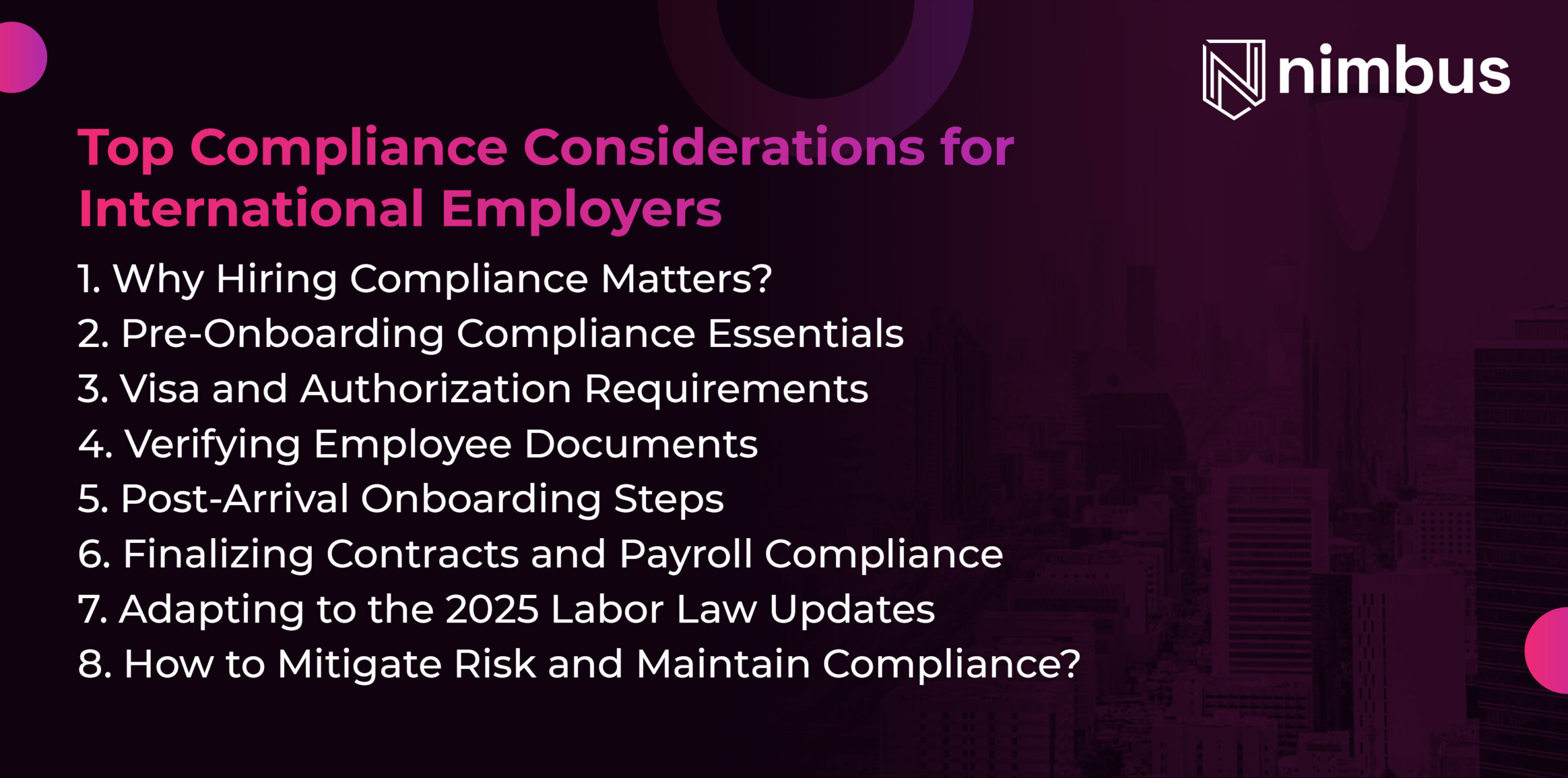Saudi Arabia continues to drive business in the Middle East, thanks to its dynamic economic environment and government-backed reforms and initiatives. As foreign businesses continue to expand their operations with business setup in the KSA, gathering a talented workforce has grown increasingly nuanced.
With labor reforms tightening in 2025, it is more important than ever for foreign employers to follow correct procedures and remain updated with legal changes to ensure their hiring practices are legally sound.
This post explores the essential compliance steps foreign companies must take when hiring in Saudi Arabia, outlines recent labor law reforms and shares insights into how professional support can streamline business operations and mitigate risks.
Top Compliance Considerations for International Employers

1. Why Hiring Compliance Matters?
Hiring foreign talent in Saudi Arabia is not as straightforward as posting a job and processing a visa. The KSA wants companies to invest not only in the economy but also in the local workforce. That’s why adhering to the Saudization program and following a strict onboarding process is crucial.
Non-compliance can result in:
- Hiring restrictions
- Inability to renew work permits
- Fines up to SAR 500,000
- Delays in project launches and operations
2. Pre-Onboarding Compliance Essentials
Before hiring a foreign worker, businesses must ensure they are properly registered and active within several official Saudi platforms. These include:
- Commercial Registration (CR) must be valid and up to date
- Accounts with platforms such as Muqeem, Qiwa, and Mudad must be established
- Documentation such as CR renewal dates must be tracked to prevent interruptions
3. Visa and Authorization Requirements
Once a company is legally prepared to hire, the next phase involves coordinating with various government portals for visa approval. This process can be highly administrative and must be handled correctly to avoid costly delays. Key steps include:
- Contract attestation by authorized government bodies
- Delegation through the Ministry of Foreign Affairs for visa issuance
- Work permit processing via Qiwa
- Managing visa quotas to avoid exceeding allocation limits
Each of these steps must be taken in order and without delay. Failure to act in time can result in bottlenecks across the entire recruitment and onboarding pipeline.
4. Verifying Employee Documents
Foreign employees must submit various personal and professional documents before their employment is confirmed. Failure to collect and verify this information correctly could result in heavy penalties. Employers are responsible for checking the following:
- Valid passport with accurate details
- Medical fitness test results from the candidate’s home country
- Police clearance certificate
- Educational and professional certifications with attestation
5. Post-Arrival Onboarding Steps
Once a foreign employee comes to the KSA, there are several critical procedures that must be completed, which include:
- Medical checkups within the Kingdom
- Health insurance registration under the employee’s border number
- Verification of insurance registration with the Council of Cooperative Health Insurance (CCHI)
- Linking health insurance to the Iqama (residency permit)
Skipping any of these requirements could jeopardize the employee’s legal working status and the employer’s standing with authorities.
6. Finalizing Contracts and Payroll Compliance
Once the employee is settled, the contract must be finalized in accordance with Saudi labor law. This includes:
- Contract registration and signing through Qiwa
- General Organization for Social Insurance (GOSI) registration
- Processing salaries through Mudad in compliance with the Wage Protection System
Each of these steps ensures both legal protection for the employee and full accountability for the employer.
7. Adapting to the 2025 Labor Law Updates
Saudi Arabia’s labor laws underwent major reforms in February 2025. These updates are designed to create a more equitable labor market and must be factored into your company’s hiring policy moving forward. The changes now mandate:
- Written fixed-term contracts for all foreign employees
- Automatically renewable one-year agreements if no specific term is mentioned
- A maximum probation period of 180 days, with automatic extensions beyond 90 days requiring no additional written agreement
- Obligatory training policies for Saudi nationals
- Easier job mobility for foreign workers affected by Saudization non-compliance
8. How to Mitigate Risk and Maintain Compliance?
Given the complexity and evolving nature of employment regulations in Saudi Arabia, businesses are advised to work with specialized partners. Boutique advisory firms like Nimbus Consutancy provide professional business setup services and local expertise to support employers with hiring.
The expert assistance allows business owners to focus on core operations while trusting that their compliance risks are being managed by professionals on the ground.
Plan Ahead, Stay Compliant
Having a talented and diversified workforce in Saudi Arabia is a strategic move, but only if done right. From legal registration to visa processing and contract finalization, the process is intricate and requires timely execution.
However, with 2025’s labor law changes now in effect, understanding the landscape is a business imperative. When handled proactively, it sets the foundation for sustainable business operations and a strong employer brand.



